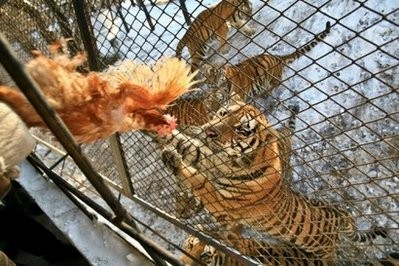Eleven Siberian tigers have starved to death over the past three months at a zoo in northeast China, after the cash-strapped animal park fed them cheap chicken bones, state media reported.
Liu Xiaoqiang, the vice head of the wild animal protection office in Shenyang, the capital of Liaoning province, said the 11 tigers had died due to malnutrition, Xinhua news agency said.
Two hungry tigers at the same zoo in Shenyang severely mauled a zoo worker in November, in an attack officials said was due to the predators' lack of food. The man survived, but the tigers were shot during the rescue.

After the incident, work safety officials asked the zoo's owners to confine the remaining tigers to their cages, which added to their health problems, the report said Thursday.
China has more than 200 zoos, according to the Chinese Association of Zoological Gardens. But only large zoos in major cities such as Beijing and Shanghai receive government funding and attention, state media say.
"Many privately-owned zoos are under financial pressure, and most of them fail to feed the animals well," said Liu.
China said last month it had nearly 6,000 tigers in captivity, but just 50-60 left roaming in the wild, including about 20 wild Siberian tigers.
There are in theory four varieties of wild tigers in China, but one of them -- the South China tiger -- has not been spotted in the wild since the late 1970s. In the 1950s, there were around 4,000 of the subspecies.
Degradation of the animal's habitat and poaching of the tiger and its prey are blamed for the rapid disappearance of the endangered species.
In the 1980s, China set up tiger farms to try to preserve the big cats, intending to release some into the wild.
But those farms have come under the international spotlight, with some conservation groups saying they use the great cats for their parts.
China banned the international trade in tiger bones and related products in 1993, and is a signatory to the Convention on International Trade in Endangered Species (CITES), which also bars such trade.
The global wild tiger population is estimated to be at an all-time low of 3,200, down from an estimated 20,000 in the 1980s and 100,000 a century ago.
























